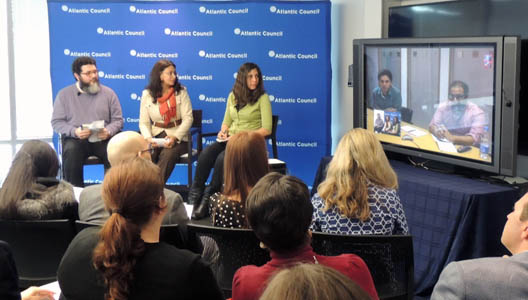 Since the ouster of former president Mohamed Morsi in July 2013, a wave of nationalist fervor has swept over Egypt. Calls for Defense Minister Abd al-Fattah al-Sisi to run for president grow while the state has largely silenced dissident political voices throughout the country. The Rafik Hariri Center for the Middle East hosted a panel discussion on March 18th offering a unique perspective from a select group of EgyptSource contributors on unheard stories, the challenges since the revolution, and efforts to build a stronger civil society . The discussion featured Rafik Hariri Center nonresident fellow Sarah El-Sirgany, Salafayo Costa founder Mohammad Tolba, photojournalist Mosa’ab El-Shamy, and Daily News Egypt journalist Basil Dabh. Mirette F. Mabrouk, deputy director for regional programs at the Rafik Hariri Center for the Middle East, moderated the discussion.
Since the ouster of former president Mohamed Morsi in July 2013, a wave of nationalist fervor has swept over Egypt. Calls for Defense Minister Abd al-Fattah al-Sisi to run for president grow while the state has largely silenced dissident political voices throughout the country. The Rafik Hariri Center for the Middle East hosted a panel discussion on March 18th offering a unique perspective from a select group of EgyptSource contributors on unheard stories, the challenges since the revolution, and efforts to build a stronger civil society . The discussion featured Rafik Hariri Center nonresident fellow Sarah El-Sirgany, Salafayo Costa founder Mohammad Tolba, photojournalist Mosa’ab El-Shamy, and Daily News Egypt journalist Basil Dabh. Mirette F. Mabrouk, deputy director for regional programs at the Rafik Hariri Center for the Middle East, moderated the discussion.
Sirgany and Tolba criticized the failure of political actors to adequately represent the Egyptian people and bring about real change, particularly on security and economic issues. Sirgany noted that many Egyptians’ voices are not heard and that many of their concerns are not political but instead focused on basic needs such as food and security. Tolba likewise underscored the importance of addressing the needs of those who are suffering and finding ways to help Egypt overcome the religious divides that plague the country. He stressed the need to think outside the box and approach these issue with unorthodox thinking, citing the example of his Salafi group that meets in a coffee shop and has invited a number of non-Muslims to join.
Dabh and El-Shamy focused their remarks on how government repression has impacted the media in Egypt and has largely stifled any narratives that attempt to challenge the narratives in state media outlets. Dabh noted that the government shutdown of several Muslim Brotherhood affiliated channels shortly after deposing Morsi is a case of how far the state will go to ensure that media outlets modify their messages to support the new transitional government. He also emphasized the importance of broadcast journalism in Egypt considering the country’s low literacy rates, noting that without robust independent media coverage, the population is forced to rely on government proclamations and state media.
